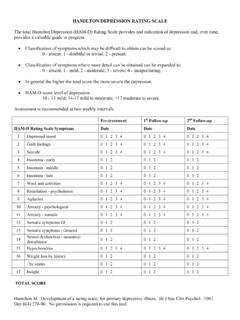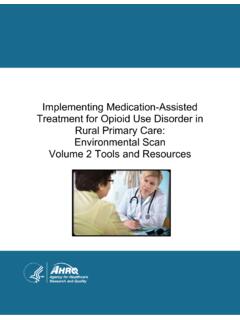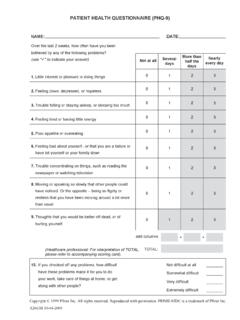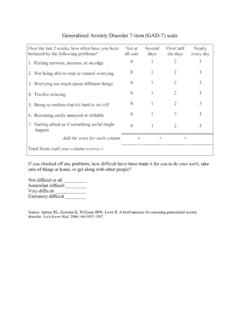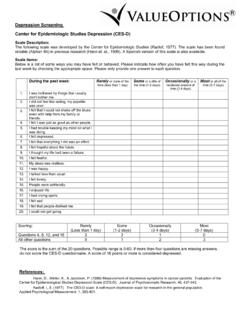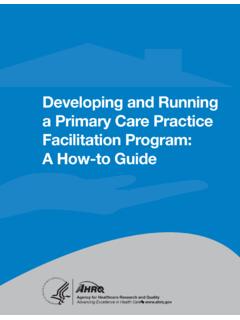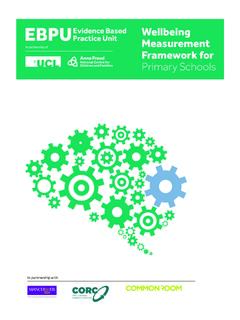Transcription of Integrating Behavioral Health and Primary Care
1 Integrating Behavioral Health and Primary Care Provider- and Practice-Level Competencies for Integrated Behavioral Health in Primary Care A Literature Review Table of Contents Introduction Purpose Methods Findings Conclusion Provider- and Practice-Level Competencies for Integrated Behavioral Health in Primary Care A Literature Review Prepared for: Agency for Healthcare Research and Quality Rockville, MD. Contract No. HHSA 290200900023I. PRISM Order No. HHSA29032013T. Prepared by: Westat Rockville, Maryland Authors: Carissa R. Kinman, Emma C. Gilchrist, Jessica C. Payne-Murphy, Benjamin F. Miller, March 2015. AHRQ Publication No. 14-0073-EF. Advancing Excellence in Health Care Table of Contents Introduction Purpose Methods Findings Conclusion This document is in the public domain and may be used and reprinted without permission except those copyrighted materials that are clearly noted in the document.
2 Further reproduction of those copyrighted materials is prohibited without the specific permission of copyright holders. Suggested Citation: Kinman CR, Gilchrist EC, Payne-Murphy JC, Miller BF. Provider- and practice-level competencies for integrated Behavioral Health in Primary care: a literature review. (Prepared by Westat under Contract No. HHSA 290-2009-00023I). Rockville, MD: Agency for Healthcare Research and Quality. March 2015. None of the investigators has any affiliations or financial involvement that conflicts with the material presented in this report. The findings and conclusions in this document are those of the authors who are responsible for its contents; the findings and the conclusions do not necessarily represent the views of the Agency for Healthcare Research and Quality (AHRQ). No statement in this article should be construed as an official position of AHRQ or of the Department of Health and Human Services.
3 Provider- and Practice-Level Competencies for Integrated Behavioral Health in Primary Care: A Literature Review ii of 18. Contents Table of Contents Introduction Purpose Methods Findings Conclusion Acknowledgments .. v 2. Purpose of This Literature 3. 4. Findings .. 5. Provider and Staff Competencies .. 5. Identification and Assessment of Behavioral Health 5. Treatment of Behavioral Health 6. Primary Care Culture: Agenda Setting, Prioritization, and Strategizing Provider Workflow .. 8. Patient Engagement .. 9. Whole-Person Care and Cultural Competency .. 9. Team-Based Care and Collaboration ..10. Communication ..10. Professional Values and Practice-Level Competencies ..12. Workflow and Administration and Leadership ..13. Practice Team Structures and Roles ..14. Organizational Support ..15. 16. 17. Provider- and Practice-Level Competencies for Integrated Behavioral Health in Primary Care: A Literature Review iii of 18.
4 Acknowledgments Table of Contents Introduction Purpose Methods Findings Conclusion The authors would like to thank the following individuals for their help in compiling articles and reviewing abstracts: Shandra Brown Levey, PhD, University of Colorado Denver Polly Kurtz, MBA, University of Colorado Denver Barbara Martin, MSN, MHP, University of Colorado Denver Rachel Harris, University of Colorado Denver The authors also thank Rebecca Noftsinger and Jeannine Sachar of Westat for their help with the literature search and editing; Leah Baruch, MD, Oregon Health and Science University, for her preparation of an annotated bibliography; and the AHRQ Academy Workforce Task Expert Panel members for their guidance in preparing the literature review. Provider- and Practice-Level Competencies for Integrated Behavioral Health in Primary Care: A Literature Review 1 of 18.
5 Introduction Table of Contents Introduction Purpose Methods Findings Conclusion Health care in the United States is highly fragmented and often falls short in multiple performance areas, including general quality of care, preventive care, and chronic disease Rapid changes in Health care, particularly the implementation of the Affordable Care Act of 2010, have initiated a surge of Health care redesign ,3 Many of these efforts seek to improve the Primary care system and deliver comprehensive care for the whole person, thereby defragmenting care and achieving the Triple Aim ( , better population Health , enhanced patient experience, and reduced cost of care, which are the guiding principles of Health care reform established by Donald Berwick, , former administrator of the Centers for Medicare & Medicaid Services). Integrating Behavioral Health into Primary care is seen as a critical step in providing comprehensive care, and has been shown to improve The Lexicon for Behavioral Health and Primary Care Integration, recently published by the Agency for Healthcare Research and Quality, defines integrated Behavioral Health care as follows:7.
6 The care that results from a practice team of Primary care and Behavioral Health clinicians, working together with patients and families, using a systematic and cost-effective approach to provide patient-centered care for a defined population. This care may address mental Health and substance abuse conditions, Health behaviors (including their contribution to chronic medical illnesses), life stressors and crises, stress-related physical symptoms, and ineffective patterns of Health care utilization (p. 9). Team-based care that includes Behavioral Health providers is quite different than traditional Primary care, and requires a unique set of skills among providers and staff. Each member of the team including front office staff, medical assistant, nurse, Behavioral Health provider, and physician plays an important role on the integrated Primary care team. Each team member must develop certain competencies to effectively carry out their role.
7 There is no clear consensus, however, about the specific competences that are necessary for providers and staff who are members of integrated Primary care teams. Integrated care also requires that practices shift their culture and make significant system-level changes. Practices must develop new workflows and clinical operations in order to effectively deliver integrated care. As discussed in this review, the literature suggests that practice-level competencies may be as important as provider- and staff-level competencies. Provider- and Practice-Level Competencies for Integrated Behavioral Health in Primary Care: A Literature Review 2 of 18. Purpose of This Literature Review Table of Contents Introduction Purpose Methods Findings Conclusion The original goal of this literature review was to understand current thinking about workforce competencies with regard to integrated Behavioral Health in Primary care.
8 We reviewed the literature to identify the competencies necessary for providers and staff who work in an integrated Primary care setting. During the review process, we identified a few articles that also addressed practice- or system-level competencies that are necessary to achieve effective integration. We decided to include these competencies as well, but we did not modify or expand the search strategy. The resulting review highlights a comprehensive set of competencies, practices, providers, and staff required to advance integration efforts and provide comprehensive care to improve patient outcomes. Provider- and Practice-Level Competencies for Integrated Behavioral Health in Primary Care: A Literature Review 3 of 18. Methods Table of Contents Introduction Purpose Methods Findings Conclusion The review team searched for articles published in 2000 2013, using the following databases: PubMed, PsycInfo, CINAHL (Combined Index to Nursing and Allied Health Literature), PILOTS (Published International Literature on Traumatic Stress), ASSIA (Applied Social Science Index and Abstracts), Sociological Abstracts, Social Services Abstracts, and ERIC (Educational Resources Information Center).
9 The searches used a systematic search strategy based on keywords, including integration, competencies, education, professional development, personnel training, professional competence, and integrated care models. A panel of experts on integrated care reviewed the initial search results, and a few articles were added to the list based on their suggestions. In addition, we searched relevant organization and government Web sites to ensure the inclusion of relevant documents. Next, the review team established a set of parameters for the inclusion and exclusion of articles to ensure a comprehensive collection of sources, including contextual and research evidence. In order to be included in the review, an article had to discuss one of two main topics: Areas of competence for providers or staff working in integrated Primary care. Provider types could include, but were not limited to, psychologists, psychiatrists, Primary care physicians, nurses, patient navigators, care coordinators, social workers, or pharmacists.
10 Practice-level competencies for Primary care settings. Integrated care may take place in various settings, but the review included only papers that focused on Behavioral Health services provided in Primary care settings. Therefore, we excluded papers describing services in specialty mental Health settings, addiction treatment facilities, or inpatient settings, for example. Papers focused on specialty clinics HIV clinics, for example also were beyond the scope of the review. We also excluded from the initial review articles that focused on populations outside the United States, because this project focused only on settings and research. Furthermore, we excluded sources that were of poor quality, and sources such as book reviews, replies to an article, introductions to special journal topics, Web sites, periodicals, newsletters, and conference presentation abstracts.
